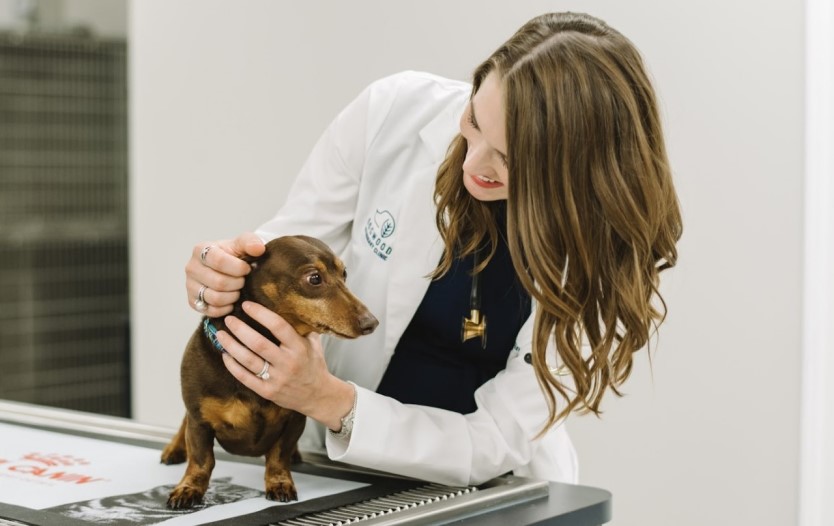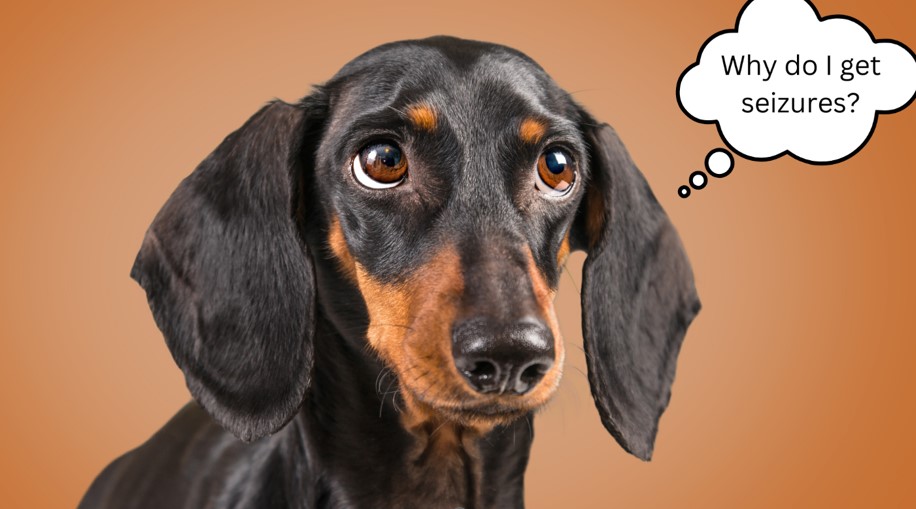Dachshunds are one of the most popular dog breeds. They possess personality, loyalty, and an undeniable cute factor. Unfortunately, Dachshunds also have certain health complications.
Dachshunds, in particular, are more prone to seizures than other dog breeds. There are a variety of reasons why Dachshunds have seizures.
This article will explore some of the most common causes of dachshund seizures and how to prevent them. Various factors, including epilepsy, kidney failure, liver disease, inherited disorders, encephalitis, poisoning, low blood sugar, and dehydration can cause seizures in Dachshunds.
Let’s dive in.
What Causes Dachshunds to Have Seizures?
Epilepsy
Canine epilepsy is a neurological disorder that can cause seizures in dogs. It is often inherited and can be challenging to diagnose.
It is the most common neurological issue in dogs and is probably one of the first things your veterinarian will suspect if your Dotson suffers from uncontrollable seizures.
Luckily, epilepsy is treatable, so your loyal companion doesn’t have to experience the symptoms of epilepsy with the proper veterinary medicine.
Accurately describe your Dachshund’s symptoms to your veterinarian to rule out epilepsy. Your Dotson will be able to enjoy life again with the right routine care.
Kidney Failure

Kidney failure is another common cause of seizures in dachshunds. As the kidneys fail, toxins can build up in the bloodstream, leading to seizures.
The good news is that most kidney-related issues are treatable. On the flip side, kidney failure is also irreversible. That’s why it’s imperative to recognize the symptoms and unusual tendencies as they occur.
If you suspect that your sausage dog is experiencing seizures due to kidney failure, have your veterinarian check its kidney function.
Liver Disease
Liver disease can also cause seizures in dachshunds. The liver plays a crucial role in detoxifying the body; toxins can build up and lead to seizures if it is not functioning correctly.
To strengthen your dog’s liver, start by providing high-quality food. Whether your Doxie prefers dry or wet food, make sure the dog food is age-appropriate. Having the correct life stages of dog food will positively impact your Dachshund’s liver health.
If you want to go above and beyond, consider making your Dachshund’s dog food at home. There are plenty of do-it-yourself resources available online. Check out the video below to get a better idea.
Inherited Disorder
Some dachshunds may have an inherited disorder that makes them more prone to seizures. If this is the case, this type of disorder is untreatable.
However, lifestyle modifications can be made to make the seizures occur less frequently. Ensuring your wiener dog has a healthy diet, and exercise routine is a great place to start.
If you suspect your Dachshund may have an inherited disorder, it is important to talk to your veterinarian. Coming up with a game plan for the long haul will keep you better prepared.
Encephalitis
Encephalitis is defined as brain inflammation and can cause seizures in dachshunds. Although not too common in Dachshunds, encephalitis is a severe condition that needs to be addressed when presented with the signs and symptoms.
Signs and symptoms include increased aggression and unusual behavior. Generally speaking, if your Dachshund is at least five years old when they have its first seizure, it is a good indication of a brain tumor.
If your Dachshund is experiencing seizures, it is vital to have them evaluated by a veterinarian to rule out encephalitis.
Poisoning
Poisoning can also cause seizures in dachshunds. If you suspect your Dachshund was exposed to a toxin, it is important to seek veterinary care immediately.
It is relatively common that your Dotson won’t exhibit strange behaviors after being poisoned. In this dangerous situation, a seizure is the last stage and can be fatal.
For this reason, monitoring your Dotson’s daily activity and making the inside and outside areas as safe as possible is essential. A dachshund’s proximity to the ground can cause them to get into things.
Keeping toxic products and dangerous items off the ground level is undoubtedly a good practice for being a wiener dog owner.
Low Blood Sugar
Low blood sugar, also known as hypoglycemia, is a decrease in glucose levels in the blood. Hypoglycemia will leave dogs feeling tired and weak. If left untreated, life-threatening seizures may occur.
If you see your Doxie in a weakened and inactive state, take them in immediately to receive veterinary care. Your veterinarian will perform a blood test to give a proper diagnosis.
If your Dachshund is diagnosed with diabetes, ask your veterinarian about how you can monitor your wiener dog’s blood sugar levels.
Feeding a balanced diet is necessary and will drastically help your Dachshund with diabetes.
Dehydration
The most common cause of seizures if overheating and dehydration. If your Dachshund happens to have diabetes, it is imperative to make sure they are hydrated.
Dehydration reduces the amount of viable blood in the body. A lack of blood flow strains the heart and can cause shock, resulting in a life-threatening seizure.
It is essential to ensure your Dachshund has access to plenty of fresh water at all times. Consider supplementing the water supply with dental-friendly electrolytes.
What Questions to Ask a Dog Breeder Before Buying a Puppy?

Visit the American Kennel Club to see what questions to ask your dog breeder before buying your adorable wiener dog. When considering Dachshund’s genealogy, knowing that your pup is coming from a healthy gene pool is essential.
Seizures are relatively common in Dachshunds compared with other dog breeds. A miniature wire-haired Dachshund and those with the dapple gene are even more prone to seizures. Sadly, this variety of Dachshunds is highly desired.
Doing your research before buying your puppy will help reduce unexpected health complications such as dog seizures, Lafora disease, heart disease, myoclonic epilepsy, and other problems associated with an unhealthy gene pool.
Common breeds such as the Siberian husky, golden retriever, Australian shepherd, and Labrador retriever all have certain health predispositions.
By making sure your puppy has a healthy gene pool, you are giving your new member of the family the best odds to live a happy and healthy life.
Is it Common for Dachshunds to Get Seizures?
Dachshunds are prone to seizures, as are other small dog breeds. It is estimated that up to 10% of Dachshunds may be affected by seizures at some point in their lifetime.
Unfortunately, these odds are significantly increased if you own a wirehaired dachshund. Depending on their genealogy, wirehaired dachshunds may experience secondary seizures and even multiple seizures throughout their lifetime.
What are the Signs of a Seizure in a Dachshund?

The signs of a seizure in a Dachshund can vary but may include the following:
- Uncontrolled shaking or convulsing
- Loss of consciousness
- Stiffness in the limbs or body
- Unresponsiveness to surroundings
- Drooling or foaming at the mouth
- Loss of bladder or bowel control
- Paddling of the limbs or jerking movements
- Dilated pupils or staring off into space
If you suspect that your Dachshund is experiencing a seizure, it’s important to stay calm and keep them safe by removing any objects or obstacles that could harm them during the seizure.
What to Do When Your Dachshund Has a Seizure?
If your Dachshund has a seizure, here are some steps you can take to help keep them safe:
- Stay calm and keep a close eye on your dog to make sure they don’t hurt itself during the seizure.
- Clear the area around your dog of sharp objects or obstacles that could cause injury.
- Do not try to restrain your dog or put anything in its mouth during the seizure, as this could cause more harm.
- If possible, recall the duration of the seizure so you can report it to your veterinarian.
- Once the seizure is over, gently comfort and reassure your dog. Some dogs may be disoriented or confused after a seizure, so providing a calm and safe environment for them to recover is crucial.
- Contact your veterinarian as soon as possible to schedule an evaluation and discuss possible treatment options.
Final Words
Various factors, including epilepsy, kidney failure, liver disease, inherited disorders, encephalitis, poisoning, low blood sugar, and dehydration, can cause seizures in Dachshunds.
If your Dachshund is experiencing seizures, it is important to have them evaluated by a veterinarian to determine the underlying cause and develop an appropriate treatment plan.
Knowing these potential causes can help keep your Dachshund healthy and seizure-free.

